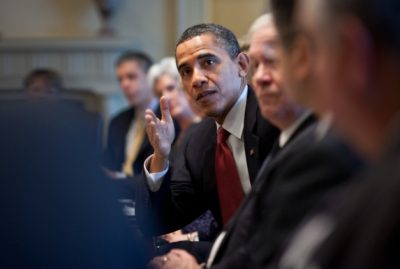Legislation

By the Numbers: How the FY 2011 Budget Impacts Immigration
After the threat of a government shutdown last week, Congress finally managed to approve a budget that will keep the government running through the 2011 fiscal year. Included in that budget, however, are a host of cuts that will impact immigrants and immigration programming in the fiscal year to come. As policy experts and economists continue to pour over the 175 page document, here are a few program areas impacted by the FY 2011 budget. Read More

President Obama Leads Meeting on Immigration, But What Happens Next?
Yesterday, President Obama hosted a White House meeting with 70 national leaders—including Mayor Bloomberg, former Gov. Arnold Schwarzenegger, Al Sharpton, evangelical leader Leith Anderson and Facebook COO Sheryl Sandberg, among others—to discuss the challenge of fixing our broken immigration system. While some advocates praised President Obama’s renewed commitment to immigration reform—and the fact that the meeting brought together a different group of national leaders allowing for new alliances—others questioned the timing of the meeting, the invite list, and the President’s sole reliance on Congress to fix our immigration system. Read More

Get Out Your Wallets, Georgians! State Lawmakers Pass Costly Immigration Measure
Despite the Ninth Circuit Court of Appeals ruling to uphold a preliminary injunction against provisions of Arizona’s SB 1070 earlier this week, state lawmakers in Georgia passed their own version of Arizona’s law (HB 87) last night, which allows police to investigate the immigration status of certain suspects and requires businesses to verify work eligibility of new hires, but not without controversy. Like other states, Georgia lawmakers mulled provisions of their enforcement-only immigration bills—provisions Georgia’s business community fears will hurt the state’s farming and restaurant industries and advocacy groups fear will lead to racial profiling. Some groups are even planning an economic boycott of Georgia—a boycott similar to Arizona’s which is still costing the state. Read More

Tuition Equity Legislation for Undocumented Students Picks Up Speed
Updated 04/12/11: The State of Maryland is well on its way to making higher education accessible to undocumented students, as both houses passed the Maryland DREAM Act and Governor O'Malley has pledged to sign into law. Last Friday, Maryland’s House of Delegate passed an in-state tuition bill (HB 470) by a vote of 74-66. On Monday, in the final hours of the 2011 legislative sessions, the General Assembly agreed on one version of the bill (the Senate passed a version last month) after Democrats compromised on an amendement. The bill, which now goes to Gov. O'Malley, allows unauthorized immigrants to access in-state tuition if they have been students at public high schools or universities in Maryland for three consecutive years. Read More

Farming Industry Urges State Lawmakers to Kill Costly Immigration Measures
For months, the business community and farming industry have warned state lawmakers that immigration enforcement legislation will hurt state economies, pointing to Arizona’s economic crash-and-burn as a prime example. This week, however, a group of agricultural leaders in Georgia upped the ante, sending a letter to state lawmakers urging them to consider just how much enforcement measures will cost the state. Georgia is one of the few remaining states (Alabama, Florida, Indiana, Oklahoma, South Carolina and Tennessee) still contemplating Arizona-style enforcement measures. Meanwhile, advocates, legislators and business leaders in other states continue to warn lawmakers that these enforcement measures will cost their state much-needed revenue and jobs. Read More

House Subcommittee Battles Diversity in U.S. Immigration System
Opponents of immigration reform are often quick to differentiate their disdain for unauthorized immigration and their alleged support of legal immigration. But finding evidence of their support for legal immigration has always been difficult. Over the past several months, the House Subcommittee on Immigration Policy and Enforcement has conducted several hearings where some members have questioned the value of most forms of immigration, including legal avenues. This week, the Subcommittee tackled diversity visas, a program which provides 50,000 green cards annually by lottery to persons from countries that do not currently send many immigrants to the United States. And per usual, restrictionist Subcommittee members used the hearing as yet another opportunity to perpetuate the myth that all immigrants, including legal immigrants, are stealing jobs from native-born workers. Read More

Yet Another State Leaves Immigration Enforcement Bill on Cutting Room Floor
The legislative graveyard got a little bit bigger this week as lawmakers in Mississippi pronounced a series of restrictive immigration measures dead. More than 30 immigration-related bills—including an Arizona-style enforcement bill—failed to meet a legislative deadline due to disagreements over the laws’ impact on the business community. Mississippi joins nine other states (Colorado, Iowa, Kansas, Kentucky, Nebraska, New Hampshire, South Dakota, Virginia, Wyoming) where legislators have cut Arizona-style enforcement bills—bills that are, according to the Washington Post editorial board, causing many businesses to speak out for fear of sharing Arizona’s economic fate. Read More

House Subcommittee Hearing Highlights U.S. Need for Foreign Scientists and Engineers
Today, a House Immigration Subcommittee hearing underscored the U.S. economy’s reliance on scientists and engineers from abroad. The hearing, entitled “H-1B Visas: Designing a Program to Meet the Needs of the U.S. Economy and U.S. Workers,” was characterized by considerable disagreement among witnesses and subcommittee members as to how the H-1B program for highly skilled foreign professionals should best be structured in terms of wage protections and job portability. But virtually everyone, including Subcommittee Chairman Elton Gallegly (R-24th/CA) and Judiciary Committee Chairman Lamar Smith (R-21st/TX), agreed that foreign-born scientists and engineers, including many who come to the United States on H-1B visas, make critical contributions to the U.S. economy. Read More

State Legislators Continue to Throw Restrictive Immigration Measures Overboard
Throughout the months-long debate over restrictive immigration measures, many state lawmakers have considered the fiscal and political impacts and decided to throw them overboard. This week was no different as opposition to costly enforcement legislation continued. A tough immigration bill was likely killed in Kansas this week after the House refused to move the bill out of committee. In Georgia, more than 3,000 people took the streets outside the State Capitol urging Republican Governor Nathan Deal to re-consider two Arizona-style bills which recently passed the state’s legislature. And in Mississippi, Governor and GOP presidential hopeful, Haley Barbour, is wrestling with Arizona-style legislation—weighing his own political ambitions against the contributions immigrants make to the state. Read More

Immigrant Entrepreneurs May Speed Up Our Economic Recovery
As America’s economic recovery continues to be a national priority, leaders on both sides of the aisle are finally beginning to look at reforming our nation’s immigration system as a strategy for promoting job creating and growth. President Obama commented in his State of the Union Address that instead of expelling immigrants, we should make it easier for them to start new businesses. This Monday, House Majority Leader Eric Cantor (R-VA) commented that “if bringing in high-skilled workers from abroad helps us keep thousands of jobs here in America, our antiquated laws should not be a barrier.” And in a bipartisan effort last week, Senators John Kerry (D-MA), Mark Udall (D-CO), and Richard Lugar (R-IN) introduced the StartUp Visa Act of 2011 (Senator Kirsten Gillibrand (D-NY) has also joined as a co-sponsor). The bill is intended to “drive job creation and increase America’s global competitiveness by helping immigrant entrepreneurs secure visas to the United States.” Read More
Make a contribution
Make a direct impact on the lives of immigrants.
